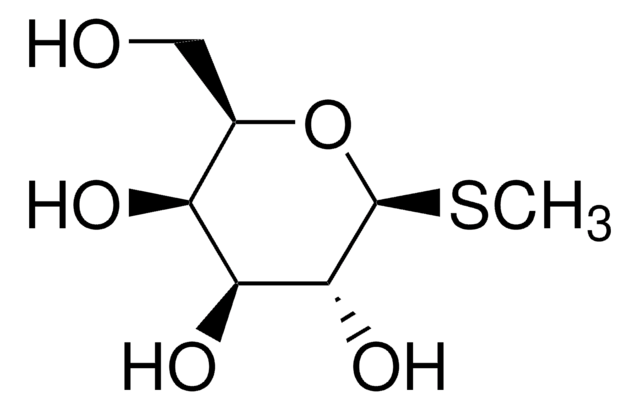G6048
Galactokinase human
recombinant, expressed in E. coli
Sign Into View Organizational & Contract Pricing
All Photos(1)
About This Item
Recommended Products
recombinant
expressed in E. coli
Quality Level
form
solution
specific activity
≥1400 unit/μg protein
mol wt
42 kDa
shipped in
dry ice
storage temp.
−70°C
Biochem/physiol Actions
Galactokinase catalyzes the phosphorylation of αD-galactose to produce galactose-1-phosphate as part of the Leloir pathway.
Physical properties
N-terminal GST-tagged 42 kDa full length protein
Unit Definition
One unit will convert 1.0 picomole of galactose to galactose-1-phosphate per minute at pH 7.4 at 30 °C.
Physical form
Supplied as a solution in 40 mM Tris-HCl, pH 8.0, 110 mM NaCl, 2.2 mM KCl, 20% glycerol, 3 mM DTT and 10-250 mM imidazole.
Signal Word
Danger
Hazard Statements
Precautionary Statements
Hazard Classifications
Eye Irrit. 2 - Repr. 1B - Skin Irrit. 2
Storage Class Code
6.1C - Combustible acute toxic Cat.3 / toxic compounds or compounds which causing chronic effects
WGK
WGK 1
Flash Point(F)
Not applicable
Flash Point(C)
Not applicable
Certificates of Analysis (COA)
Search for Certificates of Analysis (COA) by entering the products Lot/Batch Number. Lot and Batch Numbers can be found on a product’s label following the words ‘Lot’ or ‘Batch’.
Already Own This Product?
Find documentation for the products that you have recently purchased in the Document Library.
Dariusz Abramczyk et al.
Eukaryotic cell, 11(3), 334-342 (2012-01-03)
The regulation of the Saccharomyces cerevisiae GAL genes in response to galactose as a source of carbon has served as a paradigm for eukaryotic transcriptional control over the last 50 years. Three proteins--a transcriptional activator (Gal4p), an inhibitor (Gal80p), and
Shivani Malik et al.
Nucleic acids research, 40(8), 3348-3363 (2011-12-27)
Recently, we have demonstrated a predominant association of Rad26p with the coding sequences but not promoters of several GAL genes following transcriptional induction. Here, we show that the occupancy of histone H2A-H2B dimer at the coding sequences of these genes
Erin M Green et al.
Molecular biology of the cell, 23(7), 1367-1375 (2012-02-11)
The genome is nonrandomly organized within the nucleus, but it remains unclear how gene position affects gene expression. Silenced genes have frequently been found associated with the nuclear periphery, and the environment at the periphery is believed to be refractory
Aurélie Egert et al.
Plant & cell physiology, 53(5), 921-929 (2012-03-23)
Galactokinase (GALK, EC 2.7.1.6) is a cytosolic enzyme with a wide occurrence across the taxonomic kingdoms. It catalyzes the phosphorylation of α-d-galactose (Gal) to α-d-Gal-1-P. The cytotoxicity of free (unphosphorylated) Gal is well documented in plants and causes marked defects.
Nils Janzen et al.
Archives of medical research, 42(7), 608-612 (2011-12-14)
Galactokinase (GALK) deficiency is an autosomal recessive disorder causing cataract formation that can be prevented or mitigated by early diagnosis and galactose-restricted diet. The aim of this retrospective study was to explore whether GALK-deficiency meets the criteria for neonatal mass
Our team of scientists has experience in all areas of research including Life Science, Material Science, Chemical Synthesis, Chromatography, Analytical and many others.
Contact Technical Service










